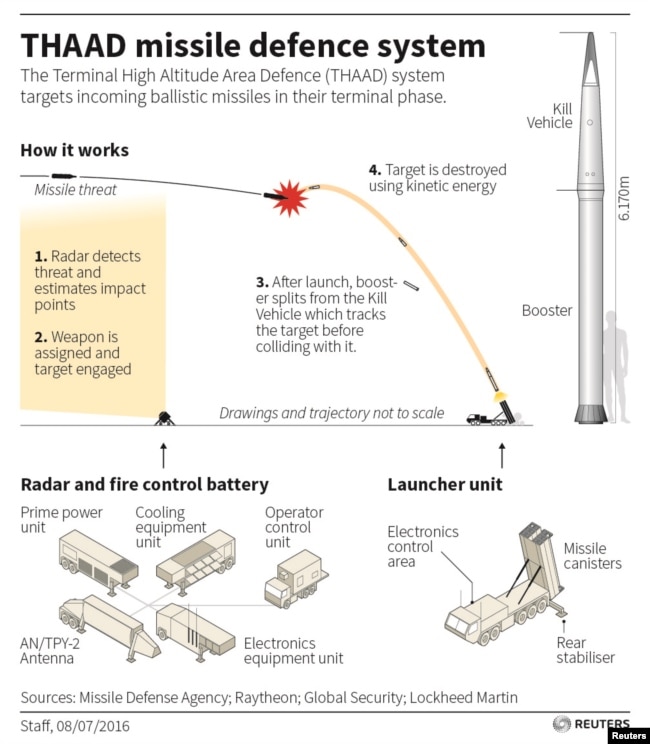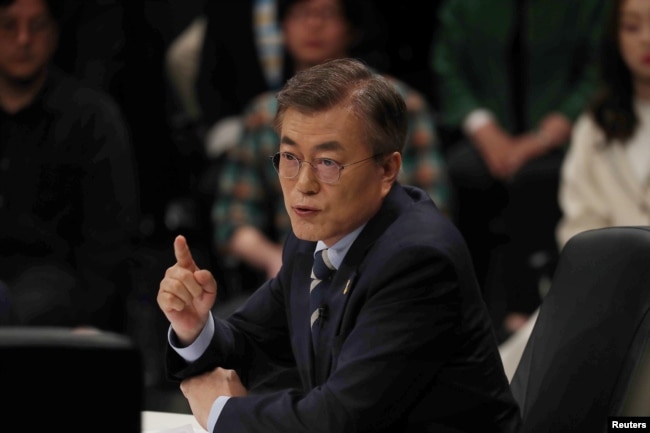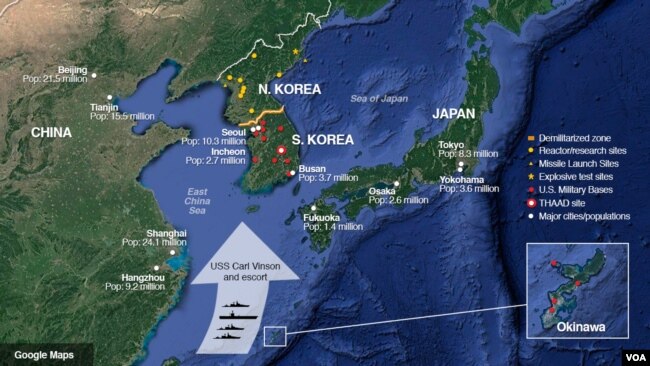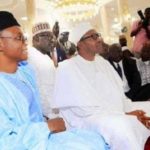SEOUL, SOUTH KOREA — The South Korean government has quickly refuted U.S. President Donald Trump’s call for Seoul to pay $1 billion for the THAAD missile defense system.
The Defense Ministry put out a statement Friday saying, “There is no change in South Korea and the United States’ position that our government provides the land and supporting facilities and the U.S. bears the cost of THAAD system’s deployment, operation and maintenance.”
The deployment of the U.S. Terminal High Altitude Area Defense (THAAD) anti-missile battery was agreed to last year by the administrations of then U.S. President Barack Obama and then South Korean President Park Geun-hye. Park was able to evade demands that she seek National Assembly approval for the deal by claiming no additional funding would be required for the THAAD deployment.
But during an interview Thursday with Reuters in Washington, President Trump said he wants South Korea to pay for the system.
A former U.S. State Department official estimated the cost of the system at $1.2 billion, but said the United States would not want to sell THAAD to Seoul.
Trump also said in the Oval Office interview he wants to resolve the crisis peacefully, possibly through the use of new economic sanctions, but added, “There is a chance that we could end up having a major, major conflict with North Korea.”
China has told Washington it has warned Pyongyang of new Chinese sanctions if it conducts another nuclear test, U.S. Secretary of State Rex Tillerson said in a Fox News interview Thursday . That would be a departure for Beijing, which has until now been unwilling to impose sanctions beyond those ordered by the United Nations.
A Chinese foreign ministry spokesman declined to confirm or deny Tillerson’s statement Friday, dismissing the question at a briefing as “hypothetical,” the Associated Press reported.
Moon Jae-in, the presidential candidate of the Democratic Party of Korea, speaks during a televised debate in Goyang, South Korea, April 25, 2017.
Impossible option
South Korea is in the midst of a presidential election brought on by the impeachment of former President Park for her alleged involvement in a multimillion dollar corruption scandal.
The leading presidential candidate, Moon Jae-in, with the liberal leaning Democratic Party of Korea, has said he wants to postpone deploying the U.S. advanced anti-missile system until the new president takes office and can evaluate its benefits and drawbacks.
Moon’s spokesman Youn Kwan-suk Friday called for the THAAD deployment to be “immediately suspended,” and a foreign policy adviser, Kim Ki-jung at Seoul’s Yonsei University, said that purchasing THAAD would be “an impossible option,” adding that the cost issue was a key concern behind the candidate’s position that the deployment to be delayed.
Moon is currently comfortably ahead in the most recent Gallup election poll, with 40 percent support.
In the last year, South Korean public opinion on THAAD shifted from opposing to supporting the controversial American weapons system, as North Korea relentlessly moved forward with nuclear and ballistic missile tests in the face of increased international sanctions. An April 17 Chosun Ilbo newspaper survey found 60 percent of the South Korean public in favor of THAAD and 30 percent opposed.
Ahn surprised
Ahn Cheol-soo, the People’s Party candidate who ranks second in the polls, has supported THAAD as a needed defense measure despite concerns among some of his more liberal supporters that it is not worth the risk of provoking North Korea and alienating China. Ahn is currently at 24 percent in the recent Gallup poll.
Beijing charges the THAAD system’s radar could be used to spy on China and has reportedly retaliated by limiting tourism to South Korea, imports of Korean cosmetics and entertainment, and shutting down some South Korean department stores in China.
Ahn’s deputy spokesman, Nemo Kim, said Friday she is surprised by Trump’s demand and stated that the People’s Party candidate would not support THAAD under such a condition.
“It’s definitely something that the Korean people cannot agree to, obviously, since this deal took place with the current (acting) administration,” Kim said.
Kim also demanded the deal struck between the Park and Obama administrations be made public immediately to clarify what South Korea’s obligations are.
Conservative silent
Conservative Liberty Korea Party candidate Hong Joon-pyo, a strong THAAD supporter who is at 12 percent in the poll, has not yet commented on Trump’s seeming demand for $1 billion in THAAD reimbursement costs.
Admiral Harry Harris, commander of the U.S. Pacific Command (PACOM), said Wednesday during a congressional hearing in Washington the THAAD system will become operational “in the coming days.”
Also this week, THAAD components, including road-mobile launchers, interceptor missiles equipped with precise infrared-seeking technology, and the powerful radar system to target enemy missiles, were delivered to the designated deployment site on a Lotte-owned golf course in the rural southeastern part of the country.
In the interview with Reuters, Trump also called the Korea-U.S. free trade agreement “horrible” and said “we are going to renegotiate that deal or terminate it.”
Source – VOA














